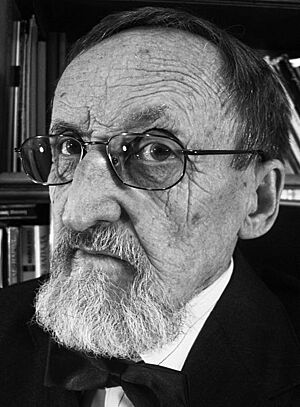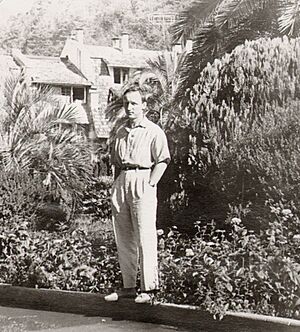Boris Parygin facts for kids
Quick facts for kids
Boris Parygin
|
|
|---|---|

Boris Parygin St. Petersburg. 2010.
|
|
| Born |
Boris Dmitrievitch Parygin
19 June 1930 Leningrad, Soviet Union
|
| Died | 9 April 2012 (aged 81) Saint Petersburg, Russia
|
| Alma mater | Saint Petersburg State University |
| Era | 20th-century |
| Region | Russian philosophy |
|
Main interests
|
social psychology |
| Signature | |
 |
|
Boris Dmitrievitch Parygin (Russian: Бори́с Дми́триевич Пары́гин) was a famous Soviet and Russian thinker. He was born on June 19, 1930, and passed away on April 9, 2012. Boris Parygin was a philosopher, sociologist, and one of the key people who helped start the field of social psychology. This area of study looks at how people's thoughts, feelings, and behaviors are influenced by others. He was an expert in understanding the history, methods, and ideas of social psychology.
Early Life and Education
Boris Parygin was born in Leningrad, which was part of the USSR (now Saint Petersburg, Russia). He lived through the very difficult Siege of Leningrad during World War II. After finishing school, he went to Saint Petersburg State University from 1948 to 1953. He studied philosophy there and graduated with excellent marks.
In 1961, he completed his first big research paper, called a thesis, about how social moods work. Later, in 1967, he earned his highest degree, a doctoral thesis. This paper was titled Social Psychology as a science (questions of history, methodology and theory).
Developing Social Psychology
After university, Boris Parygin taught philosophy at the Saint Petersburg State Pediatric Medical Academy from 1957 to 1962. In 1965, his first major book, Social Psychology as a Science, was published. This book became very popular and hard to find. A new version of the book came out in 1967, with 15,000 copies printed. It was also translated into several languages, like Czech, Bulgarian, Portuguese, and Spanish.
From 1968, Parygin led the Philosophy Department at Herzen University. There, he created a special lab for social and psychological studies. He also started the first social psychology department in the entire Soviet Union. Many important scientists gave lectures there, including G. M. Andreeva, A. A. Bodalev, L. N. Gumilev, E. A. Klimov, B. F. Lomov, B. F. Porshnev, B. M. Firsov, and V. A. Yadov. Boris Parygin also edited many books that were published from this department.
In 1971, Parygin's important work, The Basics of Socio-Psychological Theory, was published. About 20,000 copies were printed. In this book, he shared his ideas on key social and psychological topics. He especially focused on the ideas of personality and human communication. This book was very well-received by scientists in the Soviet Union and other countries. It was even republished in Germany (in Cologne in 1975 and 1982, and in Berlin in 1975 and 1976) and in Japan (Tokyo, 1977).
Parygin’s ideas were based on two main concepts: personality and how people interact socially (Parygin 1965, 1971, 1999, 2010).
His main points were:
- A person's personality is stable and stays mostly the same in different situations. But it can also change and adapt depending on the situation.
- Personality develops through social interactions as people grow up. However, the relationship between a person and their social surroundings is complex. As a person develops more, they gain more independence. In social interactions, people follow their own goals and values.
Parygin focused on the inner conflicts a person faces as they grow. He also looked at the conflicts that happen between people during social interactions. His model of personality included two different ways of looking at it: a "static" (unchanging) view and a "dynamic" (changing) view.

In 1972, at a meeting of the Central Committee of the Communist Party of the Soviet Union, some of Boris Parygin's ideas were seen as too independent and different from the official views of the time. Because of this, he took a different job at the Social and Economic Problems Institute. There, he set up and led a department that studied the social and psychological issues of groups of workers. His work in this area led to books like The Scientific-Technical Revolution and personality (1978), Social and psychological climate of the collective (1981), and Social psychology of territorial self-government (1993).
Parygin also led the Research Committee of a Social Association. He helped coordinate international research projects within a group of countries called Comecon.
Boris Parygin passed away in St. Petersburg on April 9, 2012. He was buried at the cemetery in Kirillovskoye, Leningrad Oblast.


